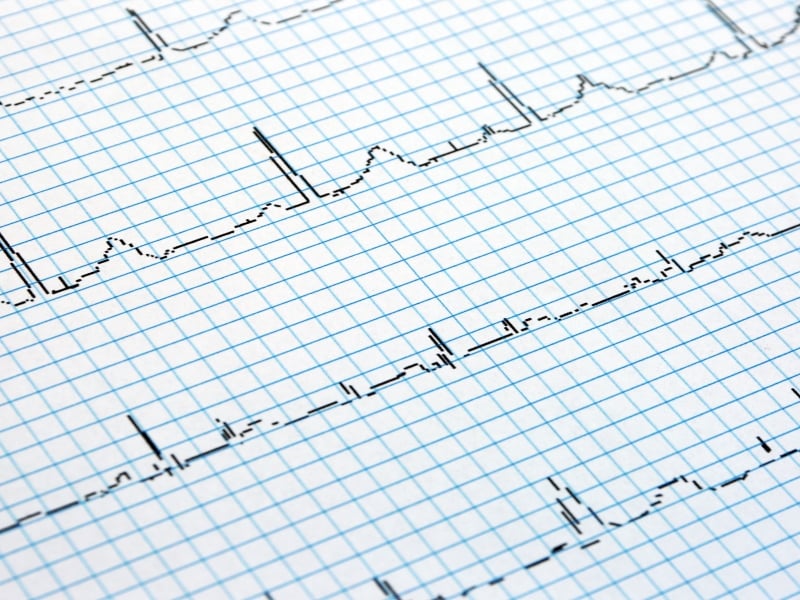What causes AV heart block?
Heart block is often caused by an underlying heart condition or other issues that can affect your heart’s electrical system. The specific cause of heart block will depend on the type you have. Causes may include:
Heart block can also happen naturally in people with a normal heart and no heart problems.
If you’re worried about having heart block or any heart condition, speak to your doctor or healthcare team.
What are the different types of heart block?
AV (atrioventricular) heart blocks
An AV heart block happens when the electrical impulses are delayed or blocked as they travel between your atria (the top chambers of your heart) and your ventricles (the bottom chambers of your heart).
There are three different ‘degrees’ of AV heart block:
- first-degree heart block
- second-degree heart block
- third-degree (complete) heart block.
Bundle branch blocks
A bundle branch block is when your electrical impulses that travel through the ventricles (the bottom chambers of your heart) are slower than normal. This happens because of a block in the path that your electrical impulses follow. This delay does not often cause symptoms.
The delay or block can happen on the pathway that sends electrical impulses to either the left or right side of the ventricles. That’s why there are two types of bundle branch blocks:
- Left bundle branch block. This is when your impulses get delayed or blocked to your left ventricle. It can be a sign of an underlying heart condition which you may need treatment for.
- Right bundle branch block. This is when your impulses get delayed or blocked to your right ventricle. It can happen in people with no heart disease or be caused by an underlying heart condition.
Tachybrady syndrome
Tachybrady syndrome happens when your heart’s sinus node, which tells your heart when to beat, does not work properly.
If your heart’s sinus node does not work properly, your heartbeat can become too fast or too slow, or switch between fast and slow rhythms. An example of this is when atrial flutter (a fast heart rhythm) switches with a slow heart rhythm.
There might also be sudden pauses in the electrical activity in your heart, which can make you feel dizzy and lightheaded.
What are the symptoms of AV heart block?
First-degree heart block does not usually cause symptoms or need treatment. Second and third-degree heart blocks can cause symptoms, which include:
- feeling faint or dizzy
- feeling tired and sometimes confused
- feeling a pressure or pain in your chest
- being short of breath.
Some people with heart block can have a very low heart rate. In some people, these heart blocks are always there, while in other people, they can come and go. AV heart blocks might turn into higher degree AV heart blocks if they're left untreated.
Sometimes there are no symptoms of heart block at all. If you experience severe or sudden symptoms, call 999 for an ambulance.
Listen to Ben's story
At the age of 33, Ben discovered he had an inherited heart condition and would need a pacemaker to help manage it. Hear him talk about what it's like to go from being a clinical lead in a hospital to a patient undergoing surgery and what he's learned about navigating life with a pacemaker at a young age.
How is heart block diagnosed?
Unless you have symptoms, heart block is often noticed while you’re having routine tests for other conditions. To diagnose heart block, your doctor will do different tests, like:
- An electrocardiogram (ECG). This measures the electrical activity of your heart. The results of an ECG can show the type of heart block you have. Your doctor may also want you to wear a portable ECG monitor to get a reading of the electrical activity of your heart over a longer period of time.
- Echocardiogram. A scan of the heart similar to an ultrasound that makes a picture of your heart.
- Cardiac MRI. A type of scan that takes detailed pictures of the inside of your heart and blood vessels.
How is heart block treated?
Some heart blocks do not need any treatment, while others do. The type of treatment you’ll need depends on the cause and your symptoms.
- If you’re diagnosed with second or third-degree (complete) heart block, you may need to have a pacemaker fitted.
- If you've got heart block that's caused by a heart attack, you may only need a temporary pacemaker while you're in hospital. If your heart does not come back to a normal heart rhythm shortly after your heart attack, you might need to have a permanent pacemaker fitted.
- If you have heart block due to medications or electrolyte imbalances, you'll be monitored closely in hospital and given treatment to reverse the medications or correct the electrolyte imbalances.
If you’re worried about your treatment or have any questions, speak to your doctor or healthcare team. They can help answer any concerns or questions that you may have.
More information and support
- Speak to our cardiac nurses by phone, callback, email or online chat on Heart Helpline (Monday to Friday, 9am to 5pm).
- Join HealthUnlocked to connect with other people affected by heart and circulatory diseases.
- Sign up to our Heart Matters magazine for online information packed with health and lifestyle advice.
- Contact us to talk to our customer care advisors, find your local BHF shop and for any comments, compliments and complaints you may have.



